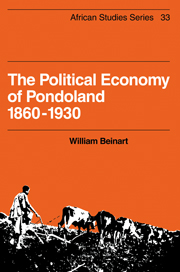Book contents
- Frontmatter
- Contents
- List of maps
- Preface
- Abbreviations
- Introduction
- 1 The political economy of Pondoland in the nineteenth century
- 2 Crops, cattle and the origins of labour migrancy, 1894–1911
- 3 Rural production and the South African state, 1911–1930
- 4 Chiefs and headmen in Pondoland, 1905–1930
- 5 Rural differentiation, alliance and conflict, 1910–1930
- Postscript
- Tables
- Notes
- Select bibliography
- Index
- BOOKS IN THIS SERIES
5 - Rural differentiation, alliance and conflict, 1910–1930
Published online by Cambridge University Press: 26 February 2010
- Frontmatter
- Contents
- List of maps
- Preface
- Abbreviations
- Introduction
- 1 The political economy of Pondoland in the nineteenth century
- 2 Crops, cattle and the origins of labour migrancy, 1894–1911
- 3 Rural production and the South African state, 1911–1930
- 4 Chiefs and headmen in Pondoland, 1905–1930
- 5 Rural differentiation, alliance and conflict, 1910–1930
- Postscript
- Tables
- Notes
- Select bibliography
- Index
- BOOKS IN THIS SERIES
Summary
Chiefs and headmen, wealthier families and locally employed Christians
The most fundamental change in the rural economy of Pondoland between 1910 and 1930 was the increased dependence of a majority of homesteads on wage labour. Yet, as has been argued, proletarianisation was not in the main predicated on rural differentiation; on the accumulation of resources by a minority of families in Pondoland and the expropriation of land and stock from others. Although the level of dependence on wages differed from homestead to homestead, the great majority of families from which workers came retained their rural homesteads, access to land and, to a considerable extent, access to cattle; the predominant form of proletarianisation was migrancy. This pattern of entry into wage labour had deep implications for the nature of differentiation in Pondoland. It has already been argued that the specific process of incorporation into the larger capitalist economy only modified, but did not transform, precolonial forms of political authority. As happened in areas of the Eastern Cape, for example, no significant class of wealthy peasants developed in the colonisation of Pondoland. Pre-colonial forms of rank and authority, which had implications for wealth in terms of income and productive capacity, were to some extent translated into a new context. This is not to suggest that the process of colonisation left social relationships in the countryside intact. The process of differentiation will be explored largely by means of different life histories, which may to some extent be regarded as ‘typical’, of men who were born and brought up in the early decades of the twentieth century.
- Type
- Chapter
- Information
- The Political Economy of Pondoland 1860–1930 , pp. 131 - 160Publisher: Cambridge University PressPrint publication year: 1982
- 1
- Cited by

